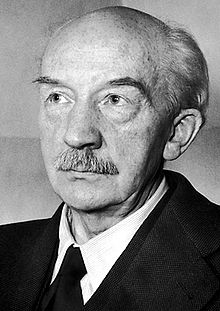- Walther Bothe
-
Walther Wilhelm Georg Bothe (8 janvier 1891 à Oranienburg, Allemagne - 8 février 1957 à Heidelberg, Allemagne) était un physicien, mathématicien et chimiste allemand qui apporta des contributions fondamentales à la physique nucléaire moderne. Il est lauréat de la moitié du prix Nobel de physique de 1954 (l'autre moitié a été remise à Max Born) « pour sa méthode des coïncidences et les découvertes qui en ont découlées[1] » (méthode utilisée en mécanique statistique).
Sommaire
Biographie
Enfance et jeunesse : de 1891 à 1920
Bothe naît à Oranienburg, de Friedrich Bothe, maître horloger, et Charlotte Bothe née Hartung, son épouse, couturière. Il passe son enfance et la majeure partie de sa jeunesse dans sa ville natale. Né au 2, Berliner Straße, il déménage en 1892 au 7, Bernauer Straße (les deux maisons furent entièrement détruites lors des bombardements de la Seconde Guerre mondiale). Il se distingue alors par un esprit aiguisé et logique, une volonté inflexible et un don pour la musique et la peinture.
Il passe son baccalauréat en 1908 à Berlin, puis y étudie la physique, les mathématiques, la chimie et la musique à l'université jusqu'en 1913. Il finance ses études par des cours privés et des travaux occasionnels pour compléter ses bourses.
Après avoir passé son Lehramtsprüfung (examen d'enseignant) en 1913, il travaille un temps comme assistant à la Landwirtschaftliche Hochschule (école supérieure d'agriculture) de Berlin. Mais il est vite engagé au laboratoire sur la radioactivité du Physikalisch-Technische Reichsanstalt, créé un an plus tôt par Hans Geiger. Élève de Max Planck, il soutient en 1914 sa thèse de doctorat : Au sujet de la théorie moléculaire de la réfraction, réflexion, dispersion et extinction
Au cours de la Première Guerre mondiale, Bothe est fait prisonnier de guerre par les Russes. Durant sa captivité, il développe avec des moyens de fortune des fabriques d'allumettes et de soude. Il contribue en outre à plusieurs problèmes de mathématiques et se consacre à l'apprentissage du russe.
Le 8 juillet 1920, à Moscou, il épouse Barbara (Warwara) Belowa. Il l'avait rencontrée à Berlin avant la guerre et correspondait régulièrement avec elle. De ce mariage ils auront deux filles. Il retourne en Allemagne en 1920.
Publications
- (avec Hans Geiger), Experimentaler Teil, 1921
- Bemerkung zur vorstehenden Arbeit, 1921
- Remarks on the Leipziger DÒ attempt, 1941
- The distribution of velocity of the neutrons in a braking means, 1942
- The vermehrung of fast neutrons in uranium and some other work from the KWI Heidelberg
- Over radiation protection walls
- (avec W. Fünfer), Layer attempts with variation of the u and DÒ thicknesses
Notes et références
- (en) « for the coincidence method and his discoveries made therewith » in Personnel de rédaction, « The Nobel Prize in Physics 1954 », Fondation Nobel, 2010. Consulté le 15 juin 2010
Liens externes
- (en) Biographie sur le site de la Fondation Nobel (la page propose plusieurs liens relatifs à la remise du prix, dont un document rédigé par le lauréat - le Nobel Lecture - qui détaille ses apports)
Catégories :- Naissance en 1891
- Décès en 1957
- Physicien allemand
- Chimiste allemand
- Mathématicien allemand
- Lauréat du prix Nobel de physique
- Lauréat allemand du prix Nobel
- Étudiant de l'université Humboldt de Berlin
Wikimedia Foundation. 2010.

